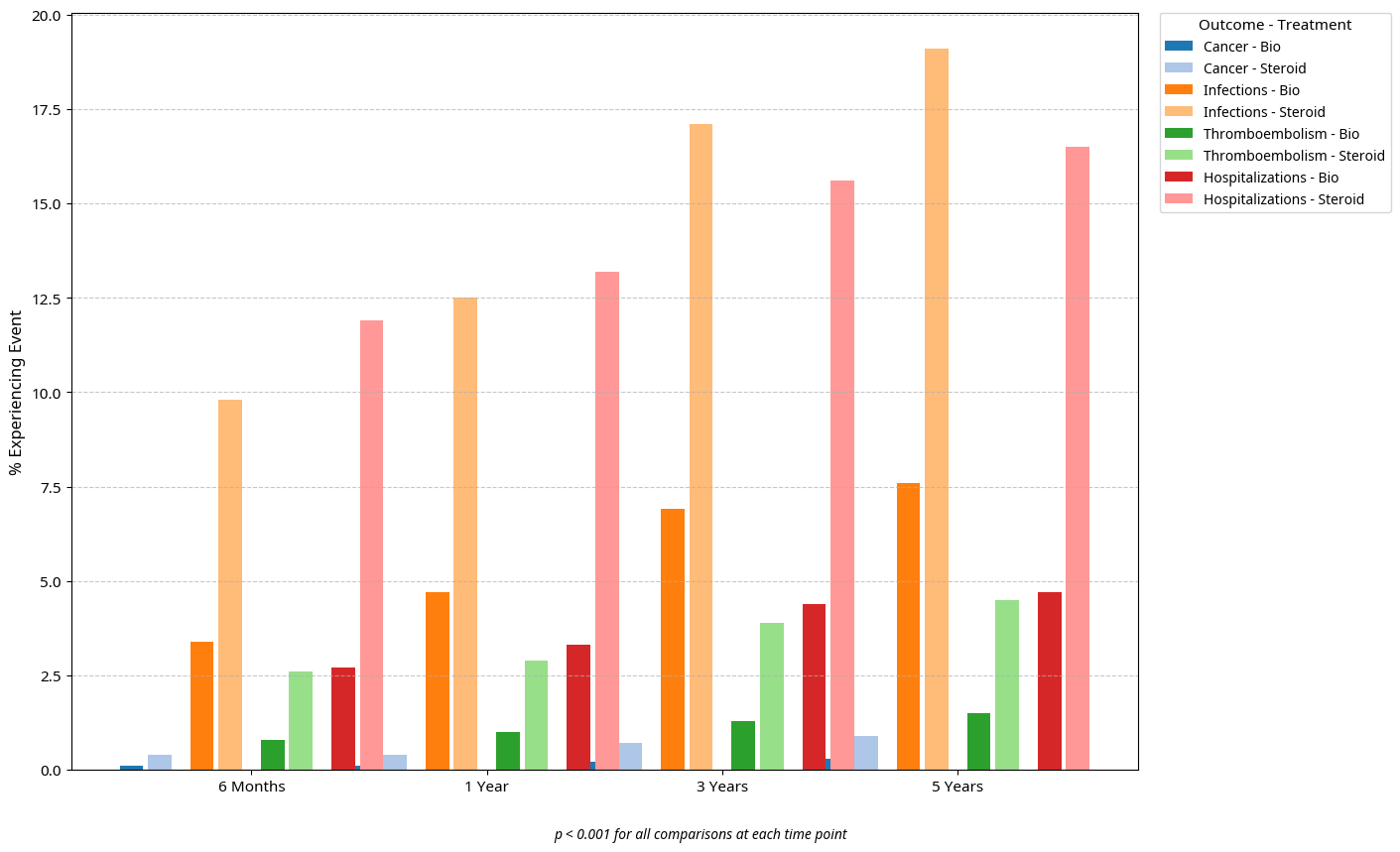Monday Poster Session
Category: IBD
P3166 - Long-Term Safety of Biologics Compared to Steroids and Aminosalicylates in Inflammatory Bowel Disease: A 5-Year Cohort Study
Monday, October 27, 2025
10:30 AM - 4:00 PM PDT
Location: Exhibit Hall

Amer Arman, MD
MedStar Health
Detroit, MI
Presenting Author(s)
Amer Arman, MD1, Omar Arman, MD, MPH2, Khaled Rafeh, MD3, Boshra Attiya, MD4, Omar Daas, MD5, Bara Abujaber, MBBS6, Noor Arman, MD5, Mazen Zamzam, BS7, Jad Bou-Abdallah, MD2
1MedStar Health, Washington, WA; 2University at Buffalo, Buffalo, NY; 3School of Medicine, The University of Jordan, Shmeisani, 'Amman, Jordan; 4Jordan University of Science and Technology, Irbid, Irbid, Jordan; 5University of Jordan School of Medicine, Amman, 'Amman, Jordan; 6MedStar Georgetown/Washington Hospital Center, Washington, DC; 7Oakland University William Beaumont School of Medicine, Royal Oak, MI
Introduction: Inflammatory bowel disease (IBD), including Crohn’s disease and ulcerative colitis, requires effective long-term therapy to optimize outcomes. Biologics, steroids, and aminosalicylates are commonly used treatments, but concerns remain about their long-term safety, particularly regarding cancer, infections, thromboembolism, and hospitalizations. This study evaluates and compares the long-term safety profiles of biologics versus steroids and aminosalicylates over five years using real-world data.
Methods: We conducted a retrospective cohort study using the TriNetX Research Network, including IBD patients aged ≥18 years treated with biologics or steroids and aminosalicylates from 2015 to 2020. Propensity score matching balanced demographic and clinical characteristics between cohorts (n = 19,610 each). Incidence of cancer, infections, thromboembolism, and hospitalizations was assessed at 6 months, 1 year, 3 years, and 5 years. Risk estimates were compared, and Kaplan-Meier analysis with hazard ratios (HR) evaluated event-free probabilities.
Results: Biologic therapies consistently demonstrated superior safety compared to steroids and aminosalicylates across all time points (Figures 1 and 2). Cancer-free survival at 5 years was significantly higher in the biologic group (99.32% vs. 98.43%), as were infection-free (86.30% vs. 68.42%), thromboembolism-free (97.55% vs. 92.61%), and hospitalization-free probabilities (92.16% vs. 77.30%; p < 0.001 for all). Incidence rates were lower in the biologic group for cancer (0.3% vs. 0.9%), infections (7.6% vs. 19.1%), thromboembolism (1.5% vs. 4.5%), and hospitalizations (4.7% vs. 16.5%; p < 0.001 for all).
Discussion: Biologic therapies significantly outperformed steroids and aminosalicylates in long-term safety, reducing the risks of cancer, infections, thromboembolism, and hospitalizations over five years. These findings support biologics as the preferred treatment strategy in IBD management, particularly for patients at higher risk of severe complications. By clarifying the safety profiles of these therapies, these results reinforce the role of biologics in evidence-based clinical practice. Future prospective studies should validate these findings and investigate underlying mechanisms to optimize patient outcomes and guide individualized treatment.

Figure: Figure 1: Bar chart comparing adverse event rates (%) for Biologics (Bio) vs. Steroids over time. Outcomes shown: Cancer, Infections, Thromboembolism, Hospitalizations. Lighter shade = Bio, darker shade = Steroid.

Figure: Table 1: Event-free survival rates (%) for Biologics (Bio) vs. Steroids over time. Outcomes shown: Cancer-Free, Infection-Free, Thromboembolism-Free, Hospitalization-Free
Disclosures:
Amer Arman indicated no relevant financial relationships.
Omar Arman indicated no relevant financial relationships.
Khaled Rafeh indicated no relevant financial relationships.
Boshra Attiya indicated no relevant financial relationships.
Omar Daas indicated no relevant financial relationships.
Bara Abujaber indicated no relevant financial relationships.
Noor Arman indicated no relevant financial relationships.
Mazen Zamzam indicated no relevant financial relationships.
Jad Bou-Abdallah indicated no relevant financial relationships.
Amer Arman, MD1, Omar Arman, MD, MPH2, Khaled Rafeh, MD3, Boshra Attiya, MD4, Omar Daas, MD5, Bara Abujaber, MBBS6, Noor Arman, MD5, Mazen Zamzam, BS7, Jad Bou-Abdallah, MD2. P3166 - Long-Term Safety of Biologics Compared to Steroids and Aminosalicylates in Inflammatory Bowel Disease: A 5-Year Cohort Study, ACG 2025 Annual Scientific Meeting Abstracts. Phoenix, AZ: American College of Gastroenterology.
1MedStar Health, Washington, WA; 2University at Buffalo, Buffalo, NY; 3School of Medicine, The University of Jordan, Shmeisani, 'Amman, Jordan; 4Jordan University of Science and Technology, Irbid, Irbid, Jordan; 5University of Jordan School of Medicine, Amman, 'Amman, Jordan; 6MedStar Georgetown/Washington Hospital Center, Washington, DC; 7Oakland University William Beaumont School of Medicine, Royal Oak, MI
Introduction: Inflammatory bowel disease (IBD), including Crohn’s disease and ulcerative colitis, requires effective long-term therapy to optimize outcomes. Biologics, steroids, and aminosalicylates are commonly used treatments, but concerns remain about their long-term safety, particularly regarding cancer, infections, thromboembolism, and hospitalizations. This study evaluates and compares the long-term safety profiles of biologics versus steroids and aminosalicylates over five years using real-world data.
Methods: We conducted a retrospective cohort study using the TriNetX Research Network, including IBD patients aged ≥18 years treated with biologics or steroids and aminosalicylates from 2015 to 2020. Propensity score matching balanced demographic and clinical characteristics between cohorts (n = 19,610 each). Incidence of cancer, infections, thromboembolism, and hospitalizations was assessed at 6 months, 1 year, 3 years, and 5 years. Risk estimates were compared, and Kaplan-Meier analysis with hazard ratios (HR) evaluated event-free probabilities.
Results: Biologic therapies consistently demonstrated superior safety compared to steroids and aminosalicylates across all time points (Figures 1 and 2). Cancer-free survival at 5 years was significantly higher in the biologic group (99.32% vs. 98.43%), as were infection-free (86.30% vs. 68.42%), thromboembolism-free (97.55% vs. 92.61%), and hospitalization-free probabilities (92.16% vs. 77.30%; p < 0.001 for all). Incidence rates were lower in the biologic group for cancer (0.3% vs. 0.9%), infections (7.6% vs. 19.1%), thromboembolism (1.5% vs. 4.5%), and hospitalizations (4.7% vs. 16.5%; p < 0.001 for all).
Discussion: Biologic therapies significantly outperformed steroids and aminosalicylates in long-term safety, reducing the risks of cancer, infections, thromboembolism, and hospitalizations over five years. These findings support biologics as the preferred treatment strategy in IBD management, particularly for patients at higher risk of severe complications. By clarifying the safety profiles of these therapies, these results reinforce the role of biologics in evidence-based clinical practice. Future prospective studies should validate these findings and investigate underlying mechanisms to optimize patient outcomes and guide individualized treatment.

Figure: Figure 1: Bar chart comparing adverse event rates (%) for Biologics (Bio) vs. Steroids over time. Outcomes shown: Cancer, Infections, Thromboembolism, Hospitalizations. Lighter shade = Bio, darker shade = Steroid.

Figure: Table 1: Event-free survival rates (%) for Biologics (Bio) vs. Steroids over time. Outcomes shown: Cancer-Free, Infection-Free, Thromboembolism-Free, Hospitalization-Free
Disclosures:
Amer Arman indicated no relevant financial relationships.
Omar Arman indicated no relevant financial relationships.
Khaled Rafeh indicated no relevant financial relationships.
Boshra Attiya indicated no relevant financial relationships.
Omar Daas indicated no relevant financial relationships.
Bara Abujaber indicated no relevant financial relationships.
Noor Arman indicated no relevant financial relationships.
Mazen Zamzam indicated no relevant financial relationships.
Jad Bou-Abdallah indicated no relevant financial relationships.
Amer Arman, MD1, Omar Arman, MD, MPH2, Khaled Rafeh, MD3, Boshra Attiya, MD4, Omar Daas, MD5, Bara Abujaber, MBBS6, Noor Arman, MD5, Mazen Zamzam, BS7, Jad Bou-Abdallah, MD2. P3166 - Long-Term Safety of Biologics Compared to Steroids and Aminosalicylates in Inflammatory Bowel Disease: A 5-Year Cohort Study, ACG 2025 Annual Scientific Meeting Abstracts. Phoenix, AZ: American College of Gastroenterology.
